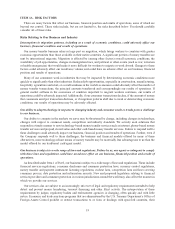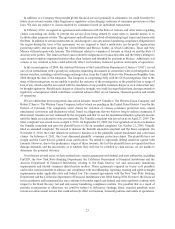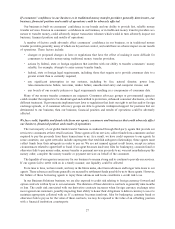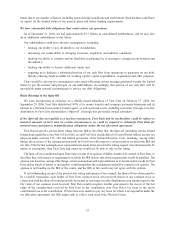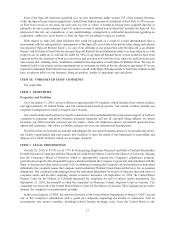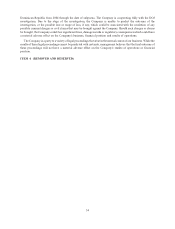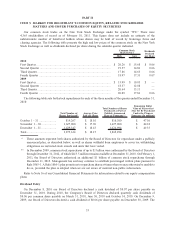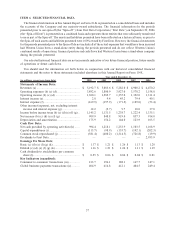Western Union 2010 Annual Report Download - page 29
Download and view the complete annual report
Please find page 29 of the 2010 Western Union annual report below. You can navigate through the pages in the report by either clicking on the pages listed below, or by using the keyword search tool below to find specific information within the annual report.If consumers’ confidence in our business or in traditional money transfer providers generally deteriorates, our
business, financial position and results of operations could be adversely affected.
Our business is built on consumers’ confidence in our brands and our ability to provide fast, reliable money
transfer services. Erosion in consumers’ confidence in our business, or in traditional money transfer providers as a
means to transfer money, could adversely impact transaction volumes which would in turn adversely impact our
business, financial position and results of operations.
A number of factors could adversely affect consumers’ confidence in our business, or in traditional money
transfer providers generally, many of which are beyond our control, and could have an adverse impact on our results
of operations. These factors include:
• changes or proposed changes in laws or regulations that have the effect of making it more difficult for
consumers to transfer money using traditional money transfer providers;
• actions by federal, state or foreign regulators that interfere with our ability to transfer consumers’ money
reliably, for example, attempts to seize money transfer funds;
• federal, state or foreign legal requirements, including those that require us to provide consumer data to a
greater extent than is currently required;
• any significant interruption in our systems, including by fire, natural disaster, power loss,
telecommunications failure, terrorism, vendor failure, unauthorized entry and computer viruses; and
• any breach of our security policies or legal requirements resulting in a compromise of consumer data.
Many of our money transfer consumers are migrants. Consumer advocacy groups or governmental agencies
could consider the migrants to be disadvantaged and entitled to protection, enhanced consumer disclosure, or other
different treatment. If governments implement new laws or regulations that limit our right to set fees and/or foreign
exchange spreads, or if consumer advocacy groups are able to generate widespread support for positions that are
detrimental to our business, then our business, financial position and results of operations could be adversely
affected.
We face credit, liquidity and fraud risks from our agents, consumers and businesses that could adversely affect
our business, financial position and results of operations.
The vast majority of our global funds transfer business is conducted through third-party agents that provide our
services to consumers at their retail locations. These agents sell our services, collect funds from consumers and are
required to pay the proceeds from these transactions to us. As a result, we have credit exposure to our agents. In
some countries, our agent networks include superagents that establish subagent relationships; these agents must
collect funds from their subagents in order to pay us. We are not insured against credit losses, except in certain
circumstances related to agent theft or fraud. If an agent becomes insolvent, files for bankruptcy, commits fraud or
otherwise fails to pay money order, money transfer or payment services proceeds to us, we must nonetheless pay the
money order, complete the money transfer or payment services on behalf of the consumer.
The liquidity of our agents is necessary for our business to remain strong and to continue to provide our services.
If our agents fail to settle with us in a timely manner, our liquidity could be affected.
From time to time, we have made, and may in the future make, short term advances and longer term loans to our
agents. These advances and loans generally are secured by settlement funds payable by us to these agents. However,
the failure of these borrowing agents to repay these advances and loans constitutes a credit risk to us.
In our Business Solutions business, we are also exposed to credit risk relating to foreign currency forward and
option contracts written by us to our customers. The duration of these derivative contracts is generally nine months
or less. The credit risk associated with our derivative contracts increases when foreign currency exchange rates
move against our customers, possibly impacting their ability to honor their obligations to deliver currency to us or to
maintain appropriate collateral with us. If a customer becomes insolvent, files for bankruptcy, commits fraud or
otherwise fails to pay us for the value of these contracts, we may be exposed to the value of an offsetting position
with a financial institution counterparty.
27




